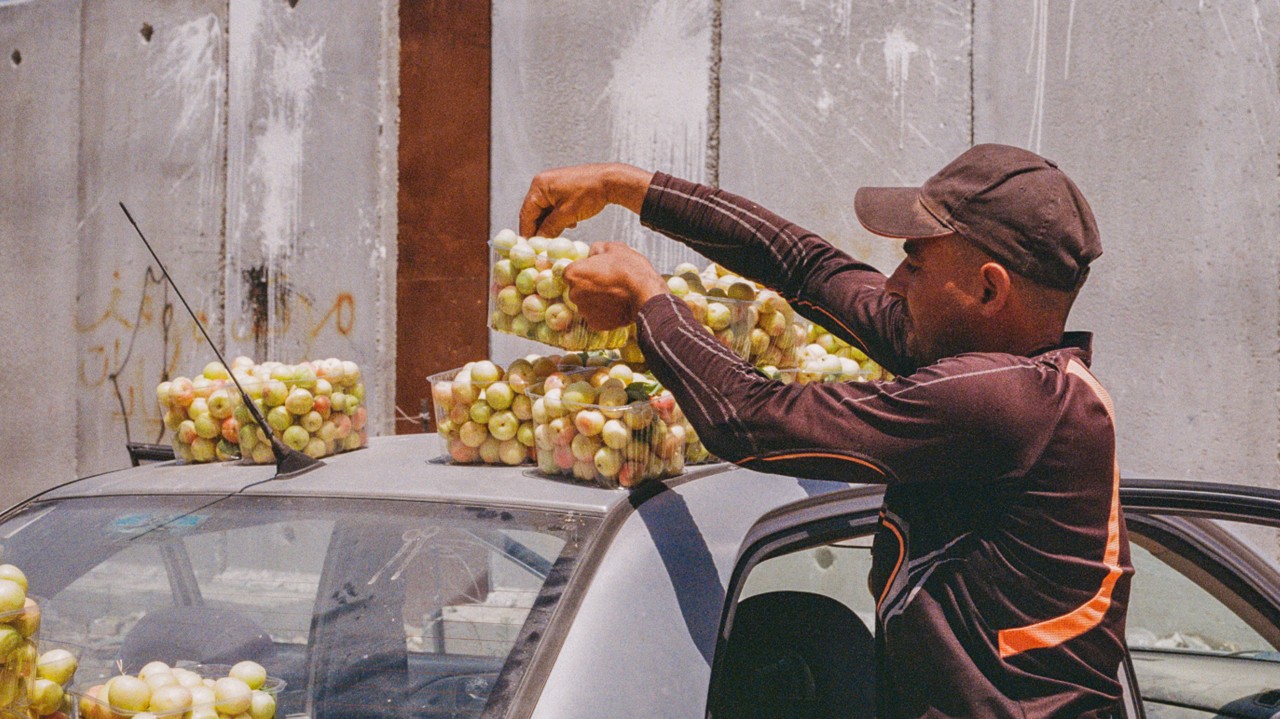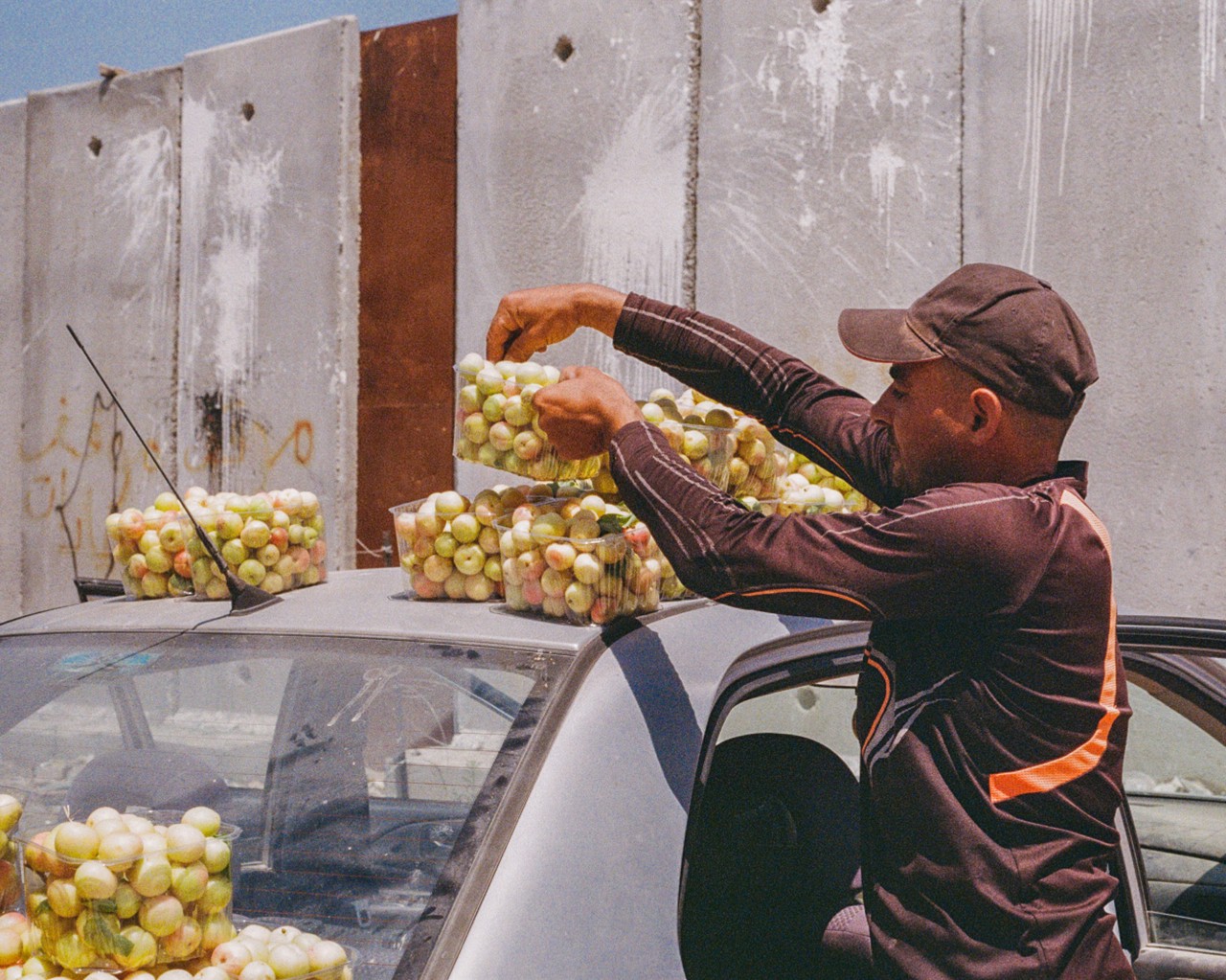

Photograph by Yasmeen Mjalli
WORDS BY KATE MCMAHON
Tucked within the rolling hills of the West Bank, the otherwise idyllic village of Farkha is facing an existential crisis as illegal Israeli settlements swallow the land where olive trees grow. The trees are an integral part of Palestinian identity, harvested each autumn by hand to produce barrels of rich, fragrant olive oil. The town’s residents are as defiant and steadfast as the trees: still producing olives despite being torched by settlers.
If not for the encroaching settlements, Farkha would be a model community of self-sufficiency. The village rejects corporate goods and supports the Boycott, Divestment, and Sanctions movement, advocating for Palestinian rights by targeting companies, organizations, and governments complicit in the Israeli occupation. While Coca-Cola is common across the West Bank, only Palestinian-made Chat fills Farkha’s fridges. Here, the village’s 1,800 residents grow their own food free of pesticides, collect rainwater in traditional rooftop cisterns, and harness their own solar energy—all while maintaining an independent grassroots democracy. The village elects its own council every four years, largely operating outside the influence of the unpopular and distrusted Palestinian Authority. Farkha was even recognized in 2017 as Palestine’s first ecovillage.
But international accolades do little to stop the land grabs.
Israeli troops invaded the West Bank in 1967 and never left. Settlers followed the soldiers. Motivated by religious zeal and government tax credits, Israeli citizens moved en masse from cities like Tel Aviv and Haifa to the occupied West Bank, building segregated Jewish-only communities on Palestinian land. Settlement construction has surged in recent years as Israeli officials push forward plans to annex the territory.
Settler attacks on the local population are common and have included burning olive groves, poisoning well water, killing livestock, and attacking farmers in their fields. Settlements in Farkha are intentionally built near the agricultural land. Many residents are now too afraid to farm.
“Palestinians have always been an agricultural people,” said Mustafa Hamad, Farkha’s mayor. “That’s why the Israeli occupation targets farming. They want to destroy the connection between Palestinians and their land.”
The percentage of Palestinian men working in agriculture dropped by nearly half between 2004 and 2018, from 12% to 6.2%. The decline among women was even steeper: 33.7% to 6.8%. Residents of Farkha consider this part of a deliberate strategy by the Israeli government to force dependency on costly, unsustainable, and pesticide-laden Israeli produce.
“The occupation wages a war on farming, making it extremely difficult and unprofitable for Palestinians,” said Hamad. “They drive up the price of water, unleash wild invasive pigs to destroy the crops, and bribe farmers to leave by offering them work permits for jobs in Israel.”
Farkha has always been an agricultural village, but its more radical roots can be traced to the arrival of Palestine’s communist party—the Popular Front for the Liberation of Palestine—in the 1950s. While the PFLP has since faded from the forefront of Palestinian politics, its influence on Farkha’s food sovereignty and collective action has remained. But these practices are being put to the test in the face of settlement expansion.
“Palestinians have always been an agricultural people. That’s why the Israeli occupation targets farming. They want to destroy the connection between Palestinians and their land.”
More settlers descended on Farkha in recent months, forcibly confiscating village land and displacing Palestinians for massive building projects. Standing on a bench in the town center, Hamad gestured toward the sprawling Ariel settlement—one of the largest Jewish-only settlements in the West Bank, complete with its own university and luxury hotel—and a few scattered outposts that were erected last autumn on distant hilltops.
“The order for seizing Farkha’s lands was issued in 1982, but Israel only started building settlements on our land in October 2024,” Hamad said. “At that time, the occupation seized 1250 dunams [303 acres] of village land for a new outpost and connected it to an illegal settler road built the previous year, intended to prevent Palestinians from reaching their farms and restricting their movement.”
The settlers plan to connect the new outposts to Ariel by building a segregated road network on Farkha’s land. If successful, the project will bulldoze olive groves, displace Farkha’s Bedouin community, further fragment the West Bank with impassable roads, and siphon sparse water resources. Hamad said the encroaching settlements threaten nearly 40% of Farkha’s water supply.
Despite the looming threats, Farkha hums with quotidian Palestinian life. The streets are lined with Ottoman architecture, verdant backyard gardens, and radical graffiti. Murals of Che Guevara and Malcolm X feature alongside expressions of support for the Kurdistan Worker’s Party, the PKK. On the outskirts of the village, olive groves and permaculture projects stretch over the hills into the horizon. The residents speak of reducing dependence on Israeli imports. Here, food sovereignty is the ethos of resistance.
Farkha resident Abdul Latif Damdoum reaffirmed this commitment to self-sufficiency as he toured his garden of ornamental plants and vegetables. Cauliflowers, cabbages, and green beans grew beneath the shade of lemon and mandarin trees. Damdoum’s father built a water filtration system to reuse dishwater in the garden; his mother took a sustainable farming class at the Qamar al Balad Educational Environmental Observatory Farm, also in Farkha, where she learned to compost with worms to make organic fertilizer.
“Here, we don’t have certainty,” Damdoum said while rifling through his basement freezer for vegetables frozen from his family’s summer harvest. “Each day, any one thing can change, or all things can change. If people don’t have food in the fridge, from where will they eat? We don’t have freedom, so we need to make products ourselves.
“Even in Gaza, people try to plant next to their tents,” he continued. “If you produce your food, you produce your freedom—but if someone gives you your food, you will never feel freedom.”
“If you produce your food, you produce your freedom—but if someone gives you your food, you will never feel freedom.”
The Israeli occupation of the West Bank is now being challenged on the international stage. The International Court of Justice ruled last July that the settlements are illegal and must be dismantled. Still, new ones are built at the behest of far-right Israeli politicians like Itamar Ben Gvir and Bezalel Smotrich. At least 250 settlements and settler outposts have been established in the West Bank and East Jerusalem, with a total population of around 700,000 settlers.
Since October 7, there have been more than 1,800 documented incidents of settler violence in the West Bank—with more than 870 Palestinians killed by either the Israeli military or Israeli settlers—largely without legal consequences. Last month, United States President Donald Trump removed all U.S. sanctions against settler organizations previously accused of violent activity. That same day, his nominee for United Nations ambassador Elise Stefanik endorsed Israel’s claim of a “biblical right” to the West Bank in opposition to the majority of the UN. Around 75% of UN member states recognize the State of Palestine and have called for an end to Israeli military rule, but to little effect.
With diminished hope for international intervention, Farkha is mounting its own legal challenge to the theft of its lands. The village is preparing to file a lawsuit to be heard in Israeli court, calling for the new outpost on village land to be dismantled and construction stopped on the settler roads. But few Palestinians win land disputes in Israeli courts, which often rely on Ottoman-era laws to justify dispossession. Concurrently, Farkha launched a Global Solidarity Campaign to leverage its recognition. The village hosts an annual Youth Festival that attracts volunteers from around the world, and it hopes to use this network to draw attention to its plight.
For now, the residents of Farkha continue to plant. They have launched a community seed dispersal program and provide assistance to anyone wishing to farm their land but who is physically unable to. The farmers of Farkha have also organized co-ops to fetch fair prices for their products in European markets. Yet Farkha’s residents believe in more than just farming. Village policies are intended to unite Palestinians in community and build a solidarity economy. The ultimate goal is to keep all Palestinians rooted in their land, tending to it despite the obstacles.
“We know we cannot really stop the settlements, but we can support the people to stay here and farm,” said Damdoum. “The biggest problem for Israel is the Palestinian people. If they take all the land and the Palestinians are still here, they can’t take our country.”
Planting Seeds of Freedom in Palestine’s First Ecovillage